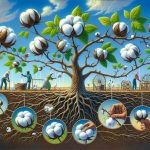I've always wondered why bamboo is touted as super sustainable, and here's the scoop. It grows ridiculously fast, like up to 35 inches a day, so it's ready to use in just a few months. Plus, it doesn't need replanting because its roots regenerate on their own—how cool is that? No fancy fertilizers or tons of water required either; it thrives on just rainfall. And after you cut it down, bamboo just bounces back, helping to prevent soil erosion and keep our planet green. Knowing all these perks just scratches the surface of what makes bamboo amazing. There's way more to uncover about this eco-hero.
Table of Contents
Key Takeaways
- Bamboo grows rapidly and regenerates without needing replanting, making it a highly renewable resource.
- It consumes minimal water and grows naturally without fertilizers, enhancing its sustainability.
- The extensive root system of bamboo prevents soil erosion and stabilizes the environment.
- Bamboo absorbs more carbon dioxide and releases more oxygen compared to many other plants.
- Its versatile applications range from construction to biodegradable products, promoting a circular economy.
Rapid Growth Rate
Bamboo's rapid growth rate really sets it apart as a sustainable choice. While some plants take their sweet time to inch up, bamboo shoots up to 35 inches in just a day. Imagine! In about 3-4 months, it's fully grown and ready to use. That's insanely fast compared to hardwood trees that take decades to mature.
This quick turnaround makes bamboo a super renewable resource. You cut it down, and before you know it, it's back up again, thanks to its self-regenerating roots. You don't even need to replant it. It just pops right back up. This is a huge plus because it keeps the cycle going without extra effort or resources.
It's this combo of being fast-growing, self-regenerating, and not needing much to thrive that makes bamboo such a sustainable crop. Every time you choose bamboo, you're opting for a resource that doesn't just grow quickly but also keeps renewing itself naturally. It's a win-win for us and the planet. So next time you're looking at products, think about this amazing plant that's doing its bit to keep things green and clean!
Minimal Resource Needs
So, let's talk about why bamboo needs so little to grow.
It doesn't just shoot up fast; it does so without needing any extra water or fertilizers.
This makes it super easy and sustainable to farm, especially compared to other crops that need a lot of pampering.
Low Water Consumption
One of the key reasons bamboo is considered sustainable is its low water needs, thriving just fine on natural rainfall. Unlike other crops that guzzle down water, bamboo's low water consumption makes it a champ in sustainable cultivation practices.
It's pretty awesome how bamboo doesn't demand much, just the basics—some sunshine and the occasional rain shower, and it's good to go. This minimal need for extra watering means that in areas where water's scarce, bamboo stands out as a smart choice.
Plus, by sticking to these eco-friendly cultivation methods, we're not just saving water; we're also doing our part in environmental stewardship. Bamboo really sets the bar high for sustainability.
Rapid Growth Rate
Given its rapid growth rate, bamboo reaches full size in just 3 to 4 months, requiring minimal resources like water and land to prosper. This rapid growth doesn't just save on resources; it makes bamboo an ace in sustainable harvesting practices.
Unlike traditional hardwoods that need decades to mature, bamboo's quick turnaround allows for frequent harvesting without depleting the environment. This efficient growth means we can keep up with demand without straining our planet.
Plus, bamboo's ability to grow so quickly with so little makes it a standout choice for anyone looking to make an eco-friendly shift. Really, the bamboo growth rate is a game changer in how we think about sustainable materials and practices.
No Fertilizers Required
Bamboo doesn't need any fertilizers to grow well, making it a super sustainable option for our planet. Here's why this matters so much:
- Zero Chemicals: Imagine a world where our soil and water are cleaner because we're not dumping chemicals into them. That's bamboo for you!
- Self-Sufficient: Bamboo thrives on its own, reducing the strain on our planet's resources.
- Eco-Friendly Champion: By skipping the fertilizers, bamboo stands out as a guardian of the environment.
- Cost-Effective: Think about the money saved from not buying fertilizers. More resources for other eco-initiatives!
Choosing bamboo means you're backing a truly sustainable, eco-friendly option. It's an all-around win for us and the environment!
Regenerative Root System
The regenerative root system of bamboo allows it to bounce back quickly after being cut down, making it a top pick for sustainable agriculture. This unique feature means that once you harvest bamboo, there's no need to replant—it regenerates on its own. That's pretty handy, right?
This powerhouse of a plant has roots that create an extensive network under the soil. What does this do? Well, it helps prevent soil erosion big time. When heavy rains come down, soils without good root systems wash away. Not with bamboo! Its roots hold the soil together, keeping the ground stable and healthy. This makes bamboo an environmentally beneficial plant that supports the ecosystem around it.
Beyond just holding soil, the regenerative abilities of bamboo mean less work for farmers and land managers. Since it springs back so quickly, it reduces the need for constant replanting, which can be labor-intensive and costly. Plus, bamboo thrives in a variety of climates and soil types, boosting its rep as a truly sustainable resource. So, it's not just about growing fast; it's about making lasting, positive impacts on the environment and agriculture.
Versatile Applications
So, let's talk about how bamboo is used in so many cool ways.
From building homes to making clothes and even innovative household items, bamboo's really making a mark.
It's fascinating how this one plant can be so crucial in different sectors, don't you think?
Building and Construction Uses
I've noticed that more architects and builders are turning to bamboo for its versatility in construction projects. They're finding that as a building material, it's not just practical but downright impressive in its range of construction applications. Here's why bamboo is the go-to choice:
- Strength Comparable to Steel – Imagine a material as strong as steel but lighter; that's bamboo for you. It brings both durability and ease of handling to the building site.
- Diverse Applications – From quaint homes to expansive structures, bamboo does it all.
- Longevity – Properly maintained, bamboo construction materials last a really long time.
- Sustainable Choice – Choosing bamboo means you're opting for an eco-friendly material that keeps the planet green and healthy.
Textiles and Clothing Production
Bamboo's making waves in the fashion world, not just for its eco-friendly appeal but also for its soft, stretchy fabrics perfect for clothing. Bamboo fabric is super versatile, ideal for a bunch of different garments because it's breathable and feels great.
But here's the scoop: the way bamboo fabric is made isn't all green and clean. The manufacturing process involves some pretty intense chemicals to turn those tough bamboo fibers into the soft textiles we love to wear.
Despite these issues, the sustainability of bamboo as a resource keeps it in the good books of many eco-conscious folks. It grows fast and doesn't need much to thrive. So, it's still a go-to for those looking to keep it earth-friendly.
Household Goods Innovation
Bamboo is revolutionizing the household goods sector with its sustainable and versatile applications. It's amazing how this plant is turning up in our homes, from the bathroom to the kitchen! Here's why I'm all in on bamboo products:
- Toothbrushes & Utensils: Swap out plastic for bamboo to cut down on waste. It's a no-brainer for a cleaner planet.
- Compostable Plates: Imagine a barbecue where you can compost your plate and cutlery right after eating!
- Durable Goods: These items aren't just eco-friendly, they're built to last. Goodbye to buying new stuff all the time.
- Supporting Sustainability: Choosing bamboo is voting for a healthier earth with every purchase.
This isn't just innovation; it's a movement towards a better future.
Carbon Sequestration Abilities
One of the standout features of bamboo is its impressive ability to absorb carbon dioxide and release oxygen, outperforming traditional hardwoods in this regard. It's fascinating to think about how much more efficiently bamboo handles CO2. In fact, a bamboo forest can stash away up to four times as much carbon as a hardwood forest of the same size. That's a huge bonus for our planet!
Bamboo's secret weapon is its rapid growth and extensive root system, which are key to its top-notch carbon sequestration capabilities. This quick grower doesn't just sprout faster than hardwoods; it also packs a heavier punch in the fight against climate change by storing a massive amount of carbon. This makes bamboo a champion in environmental conservation efforts.
Choosing products made from bamboo isn't just about going green in a trendy way; it's a solid step toward supporting sustainable practices that really amp up carbon sequestration. Every bamboo item you pick helps keep the carbon storage game strong. So, when you opt for bamboo, you're not just buying a product, you're making a choice that backs a more sustainable and environmentally friendly world.
Soil Erosion Prevention
Besides its carbon-sequestering capabilities, bamboo also plays a key role in preventing soil erosion. This is huge because soil erosion isn't just about losing dirt—it's about maintaining fertile ground that can support plant life and sustain agriculture. Bamboo's traits make it a superstar in the fight against soil degradation.
Here's why bamboo is so effective:
- Extensive Root System: Bamboo's roots dig deep and spread wide, literally holding the soil together. This network is so strong that it can significantly reduce the wash-off of topsoil during heavy rains or flooding.
- Slope Stabilization: On hills or slopes, these roots also help in anchoring the ground firmly. This reduces the risk of landslides, which aren't only dangerous but can devastate ecosystems and human settlements.
- Rapid Growth and Dense Foliage: Bamboo grows like a weed—fast and thick. This rapid growth means more coverage sooner, shielding the soil from direct impacts like raindrops that can cause erosion. Plus, its dense foliage drops plenty of leaf litter, which further protects and nourishes the soil.
- Natural Barriers: Strategically planted, bamboo groves can act as barriers, breaking the wind and slowing water flow, which minimizes soil erosion in vulnerable areas.
Planting bamboo isn't just about growing trees; it's about securing our future one root at a time.
Biodegradable Properties
In addition to tackling soil erosion, the biodegradable nature of bamboo significantly reduces its environmental footprint. Bamboo's biodegradable properties make it a superstar in the eco-friendly material league. It breaks down naturally over time, way faster than many other materials out there. This rapid decomposition is a huge win for our planet, minimizing the pile-up in landfills.
When we use bamboo products, we're not just opting for a trendy alternative. We're actively participating in a cycle that supports the environment. After its life cycle, bamboo can be composted, turning back into nutrient-rich soil. It's like giving back to Mother Earth, making it a full-circle moment in sustainability.
Choosing bamboo is also a smart move to reduce plastic pollution. Every bamboo item used is potentially one less plastic item produced and discarded. Imagine the impact if more of us made this switch! We'd see a significant drop in the plastics clogging our oceans and landscapes. So, embracing bamboo isn't just about using a natural product; it's about pushing for a cleaner, greener planet.
Economic Benefits
Bamboo isn't just good for the planet; it's also boosting economies where it's grown. As someone deeply committed to sustainable living, I've seen firsthand how bamboo is transforming lives by providing stable jobs and supporting traditional industries. These economic benefits are crucial, not just for the present, but for future generations too.
Here's why I'm thrilled about bamboo's impact:
- Job Creation: It offers countless jobs in rural areas, ensuring folks can make a living close to home.
- Supports Traditional Industries: Many local crafts rely on bamboo, which helps keep cultural heritage alive.
- Zero-Waste Production: By following a zero-waste policy, bamboo production minimizes environmental impact while maximizing resource use.
- Circular Economy: Recycling bamboo waste into new products keeps resources in use longer and reduces the need for new raw materials.
This approach not only helps local economies thrive but also aligns with sustainable practices that our planet desperately needs. By choosing bamboo, we're not just buying a product; we're supporting a system that looks after our world and its people. Isn't that something worth investing in?
Challenges and Solutions
While bamboo has many benefits, it's not without its challenges. Overfarming, for instance, can mess with biodiversity and even lead to deforestation, which is pretty ironic given bamboo's green rep. Plus, turning bamboo into products isn't always clean; it can involve nasty chemicals and doesn't always do the carbon footprint any favors.
But here's the good part: we've got solutions. First up, responsible farming is key. This means taking care not to strip all the bamboo from one area and giving it time to grow back. It's all about balance. Next, sustainable forest management, especially in places like Europe and the UK, keeps things in check by making sure our bamboo sourced is from forests that are looked after properly, not just exploited.
Another cool idea? Using recycled wood sources in the mix. This not only reduces waste but also lessens the demand on pure bamboo, making the whole process a lot more sustainable.
Frequently Asked Questions
Why Is Bamboo Considered Sustainable?
I've learned bamboo's considered sustainable because it grows fast, doesn't need pesticides, and absorbs a lot of CO2. It's a greener choice that helps fight climate change without harming the environment much.
Why Is Bamboo a Sustainable Medium for Art?
I use bamboo for art because it grows super fast and doesn't need harmful chemicals. It's eco-friendly, absorbs CO2, and doesn't harm the planet like other materials. It's perfect for sustainable art.
Is Bamboo the Most Sustainable Wood?
I'm not sure if bamboo's the most sustainable wood, but it grows super fast, doesn't need replanting, and has a low environmental impact, making it a top contender in the sustainability race.
Why Is Bamboo Important to the Environment?
Bamboo's crucial 'cause it stores carbon well, boosts oxygen levels, and supports diverse wildlife. It grows fast and prevents soil erosion, making it key for environmental conservation and stability.
- How Does Bamboo Impact Society? - April 22, 2024
- What Is the Contribution of Bamboo Crafts in the Philippines? - April 22, 2024
- Why Is Bamboo Important to Agriculture? - April 22, 2024






